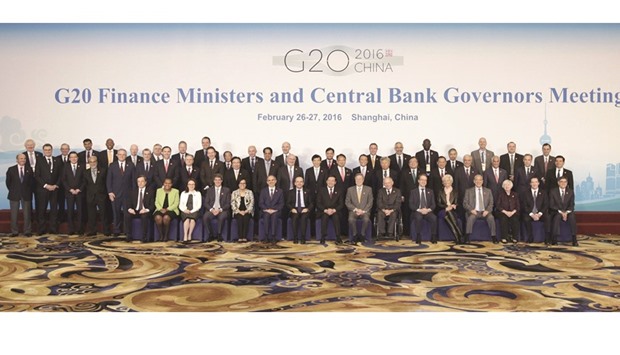Finance chiefs from the Group of 20 agreed to consult closely on foreign exchange markets and reiterated past pledges to refrain from competitive devaluations.
The G-20 members agreed to use monetary, fiscal and structural tools to boost growth, according to a final communique released in Shanghai yesterday. Underscoring concerns over the limitations of central bank-led stimulus, “monetary policy alone cannot lead to balanced growth,” the document said.
Leading into the meetings, Bank of England Governor Mark Carney warned counterparts against getting embroiled in a currency war by pushing interest rates too low, while International Monetary Fund Managing Director Christine Lagarde said the effects of monetary policies, even innovative ones, are diminishing. With the UK mulling spending cuts, Japan planning a sales tax increase, Germany’s finance minister warning debt-funded growth just leads to “zombifying” economies, and the US constrained by a lame duck president and Republican-controlled Congress, it may fall to China to ratchet up the fiscal firepower.
“Investor hopes of coordinated policy actions proved to be pure fantasy,” said David Loevinger, a former China specialist at the US Treasury and now an analyst at fund manager TCW Group in Los Angeles. “It’s every country for themselves.”
Steep losses on global stock markets and volatility in currencies this year had fuelled calls for G-20 members to do more to stoke demand and bolster stability. The IMF last month trimmed its global growth projections and said 2016 would be a “year of great challenges.”
On exchange rates, the G-20 reaffirmed that “we will refrain from competitive devaluation and we will not target our exchange rate for competitive purposes.”
The group also said “we will consult closely on exchange markets” - language that follows surprise moves by China and Japan that led to drops in their currencies. China in August devalued the yuan, then in December shifted its peg to one against a currency basket and in January jolted markets with unexpectedly low reference rates for the yuan. Japan last month stoked volatility in the yen with an unexpected adoption of negative interest rates.
Officials added a potential “Brexit” to its long worry list in the communique. That’s a win for Chancellor of the Exchequer George Osborne, who had sought to rally international finance chiefs behind the campaign to keep Britain in the European Union. The chances of the UK voting to leave the EU climbed after London Mayor Boris Johnson backed the exit, according to some analyst estimates.
Bloomberg News reported on the document earlier yesterday, when it obtained a near-final version that a person familiar with its drafting said would see only minor revision.
Key risks also include escalated geopolitical tensions, a large drop in commodity prices, and volatile capital flows, according to the document.
The “large and increasing number of refugees in some regions” was also flagged high. European officials are struggling to solve the worst migration crisis since World War II, with Slovenia and Croatia last week cutting the number of refugees they’ll let across their borders, potentially bottling up migrants arriving in Greece in what that country’s government warned could create a humanitarian disaster.
Even with that catalog of concern, G-20 officials argued recent market swings didn’t reflect global growth momentum.“While recognising these challenges, we nevertheless judge that the magnitude of recent market volatility has not reflected the underlying fundamentals of the global economy,” the communique said. “We expect activity to continue to expand at a moderate pace in most advanced economies, and growth in key emerging market economies remains strong.”
Notably absent from the communique was explicit concern over China’s economic direction. Indeed, China’s officials seem to have succeeded in achieving some of their pre-summit goals, with the document saying officials support further work to examine broader use of Special Drawing Rights and establishing a Green Finance study group.
“It would have been unusual to single China out as it is the host nation,” said Shane Oliver, head of investment strategy at fund manager AMP Capital Investors in Sydney. “The G-20 is saying all the right things, so the comments may be seen as soothing by financial markets, but I am not convinced that it means a lot more coordinated policy stimulus is about to follow.”

Attendees pose for a group photo during the G20 finance ministers and central bank governors meeting in Shanghai. Finance chiefs agreed to consult closely on foreign exchange markets and reiterated past pledges to refrain from competitive devaluations.
